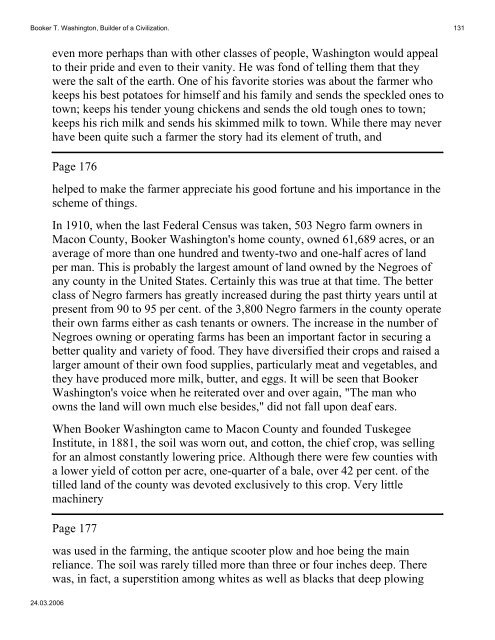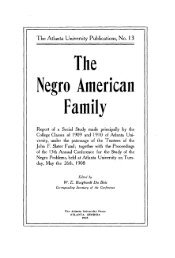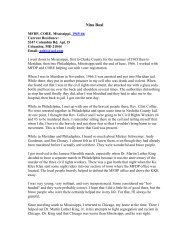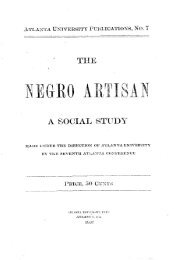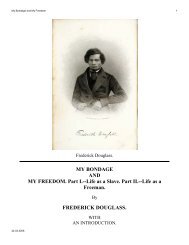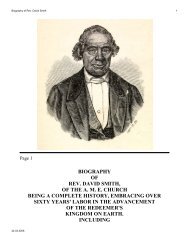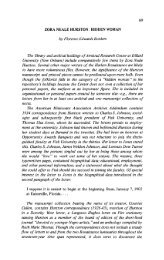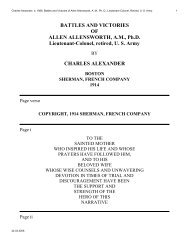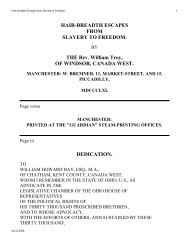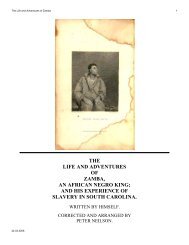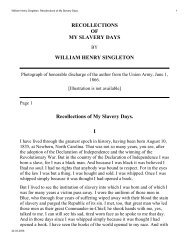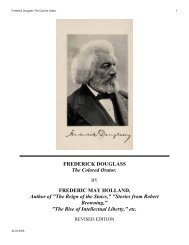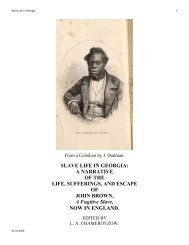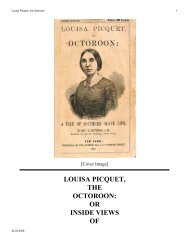Booker T. Washington, Builder o - African American History
Booker T. Washington, Builder o - African American History
Booker T. Washington, Builder o - African American History
You also want an ePaper? Increase the reach of your titles
YUMPU automatically turns print PDFs into web optimized ePapers that Google loves.
<strong>Booker</strong> T. <strong>Washington</strong>, <strong>Builder</strong> of a Civilization. 131<br />
even more perhaps than with other classes of people, <strong>Washington</strong> would appeal<br />
to their pride and even to their vanity. He was fond of telling them that they<br />
were the salt of the earth. One of his favorite stories was about the farmer who<br />
keeps his best potatoes for himself and his family and sends the speckled ones to<br />
town; keeps his tender young chickens and sends the old tough ones to town;<br />
keeps his rich milk and sends his skimmed milk to town. While there may never<br />
have been quite such a farmer the story had its element of truth, and<br />
Page 176<br />
helped to make the farmer appreciate his good fortune and his importance in the<br />
scheme of things.<br />
In 1910, when the last Federal Census was taken, 503 Negro farm owners in<br />
Macon County, <strong>Booker</strong> <strong>Washington</strong>'s home county, owned 61,689 acres, or an<br />
average of more than one hundred and twenty-two and one-half acres of land<br />
per man. This is probably the largest amount of land owned by the Negroes of<br />
any county in the United States. Certainly this was true at that time. The better<br />
class of Negro farmers has greatly increased during the past thirty years until at<br />
present from 90 to 95 per cent. of the 3,800 Negro farmers in the county operate<br />
their own farms either as cash tenants or owners. The increase in the number of<br />
Negroes owning or operating farms has been an important factor in securing a<br />
better quality and variety of food. They have diversified their crops and raised a<br />
larger amount of their own food supplies, particularly meat and vegetables, and<br />
they have produced more milk, butter, and eggs. It will be seen that <strong>Booker</strong><br />
<strong>Washington</strong>'s voice when he reiterated over and over again, "The man who<br />
owns the land will own much else besides," did not fall upon deaf ears.<br />
When <strong>Booker</strong> <strong>Washington</strong> came to Macon County and founded Tuskegee<br />
Institute, in 1881, the soil was worn out, and cotton, the chief crop, was selling<br />
for an almost constantly lowering price. Although there were few counties with<br />
a lower yield of cotton per acre, one-quarter of a bale, over 42 per cent. of the<br />
tilled land of the county was devoted exclusively to this crop. Very little<br />
machinery<br />
Page 177<br />
was used in the farming, the antique scooter plow and hoe being the main<br />
reliance. The soil was rarely tilled more than three or four inches deep. There<br />
was, in fact, a superstition among whites as well as blacks that deep plowing<br />
24.03.2006


